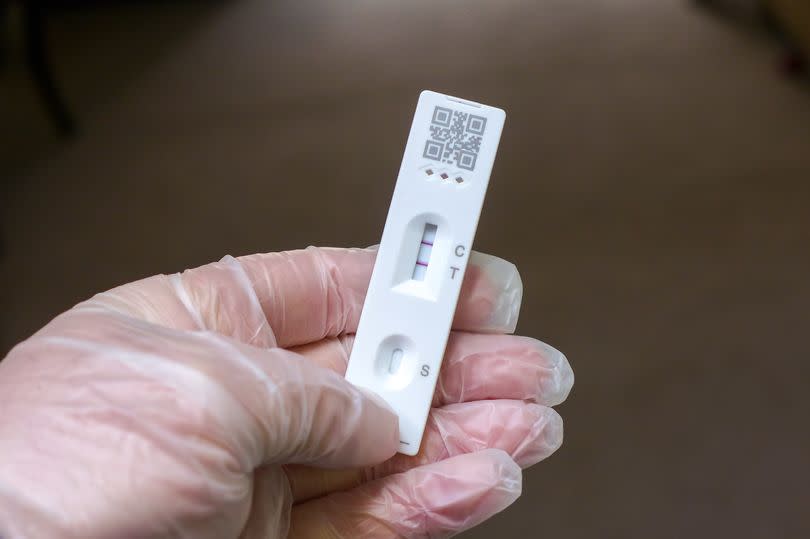Longest Covid infection lasted nearly two years as scientists warn of mutations

The longest lasting Covid infection recorded was recorded at nearly two years, scientists have revealed.
A pensioner in Holland had the virus for 613 days before he died, with the virus mutating around 50 times during that period.
According to scientists, the man, who had a weakened immune system, was a perfect breeding ground for deadly new strains of the disease.
Though there has been several cases of patients having the virus for hundreds of days, the 72-year-old man, who eventually died with his infection, is believed to have had the virus for the longest period.
Whereas healthy patients infected with Covid-19 can get rid of the virus within days to weeks, immunocompromised patients can develop a persistent infection with a prolonged viral replication and evolution.
It is believed the initial emergence of the Omicron variant of Covid in late 2021 originated in an immunocompromised person, highlighting the importance of keeping a close eye on such patients.
Scientists say the use of targeted immune pressure including antibody therapies or novel antivirals can also further promote the emergence of viral escape variants.
In a report to be presented at the European Society of Clinical Microbiology and Infectious Diseases' (ESCMID) global conference in Barcelona next week, researchers described a 72-year-old man in Holland they believe to have had the virus for the longest time.
The elderly man was admitted to the Amsterdam University Medical Center in February 2022 with a Covid infection, believed to be of the Omicron variant.
Due to a history of stem cell transplantation treatment, he was defined as being immunocompromised.
This was further complicated by the development of a post-transplant lymphoma, for which he received a targeted cancer medication which depletes all available B-cells - including those that normally produce the Covid antibodies.
The elderly man had received multiple Covid vaccinations without any measurable antibody response upon being admitted to hospital.
He received additional treatment including an anti-SARS-CoV-2 directed antibody called sotrovimab, the anti-IL6 antibody sarilumab and dexamethasone without any clinical response.
But researchers found the virus developed a sotrovimab-resistance mutation as early as 21 days after receiving the antibody.
They also noted that anti-spike antibody development in the first month was minimal, indicating that the patient's immune system was incapable of clearing the virus.
The prolonged infection led to the emergence of a novel, immune-evasive variant of the virus due to its extensive evolution within a host.
Sadly, the elderly man eventually died from a relapse of a condition in his blood.
The researchers said he had remained Covid positive, with high viral loads, for a total of 613 days. Fortunately, the mutated variant that had developed in the patient was not transmitted to anyone else.
Over his one year and eight months with the virus, the man's infection led to him having prolonged isolation periods and using protective gear to stop the spread of the virus, which the researchers say greatly reduced his quality of life in his final days.
Tests revealed his virus underwent as many as 50 mutations.
Dr Magda Vergouwe, a PhD candidate at the Center for Experimental and Molecular Medicine (CEMM) in Amsterdam and lead author of the study, warned that the case underscored the importance of tracking the infections of the most vulnerable patients, whose bodies could be used as hosts to develop resistant mutations of the Covid virus.
"This case underscores the risk of persistent SARS-CoV-2 infections in immunocompromised individuals as unique SARS-CoV-2 viral variants may emerge due to extensive intra-host evolution," Dr Vergouwe explained.
"We emphasise the importance of continuing genomic surveillance of SARS-CoV-2 evolution in immunocompromised individuals with persistent infections given the potential public health threat of possibly introducing viral escape variants into the community.”
However, Dr Vergouwe and her team also acknowledged there had to be a balance between protecting the world from dangerous new variants and providing humane, supportive end-of-life care to severely ill patients.
Possible solutions the researchers suggested include an increased awareness of potential risks combined with providing early accessible testing of known contacts of the patients as soon as they develop relevant symptoms.
This could then be combined with genomic surveillance of the virus to assess the public health threat together with public health professionals.
Dr Vergouwe added that though there's an increased risk of the development of novel variants in immunocompromised patients, not every variant that develops will be of public concern.
The underlying mechanisms involved in the development of a variant of concern are much more complex, as they are also dependent on factors in the population surrounding the patient, including the prevalence of B- and T-cell related immunity.
“The duration of SARS-CoV-2 infection in this described case is extreme, but prolonged infections in immunocompromised patients are much more common compared to the general community," Dr Vergouwe said.
"Further work by our team includes describing a cohort of prolonged infections in immunocompromised patients from our hospital with infection durations varying between one month and two years.
"However, from the viewpoint of the general public, prolonged infections remain rare as the immunocompromised population is only a very small percentage of the total population.”
Join the Daily Record's WhatsApp community hereand get the latest news sent straight to your messages.

 Yahoo News
Yahoo News 
